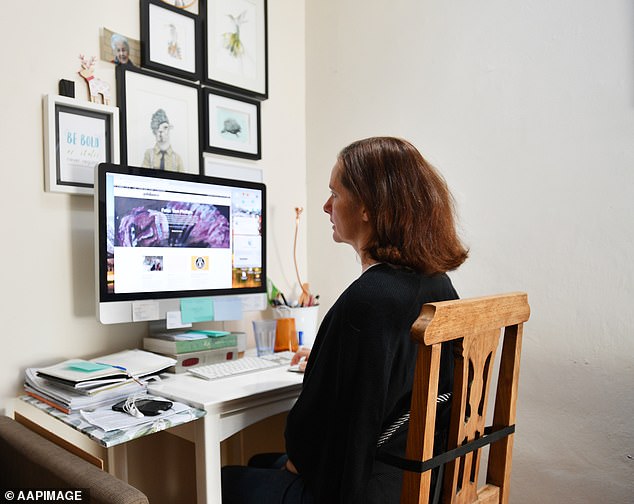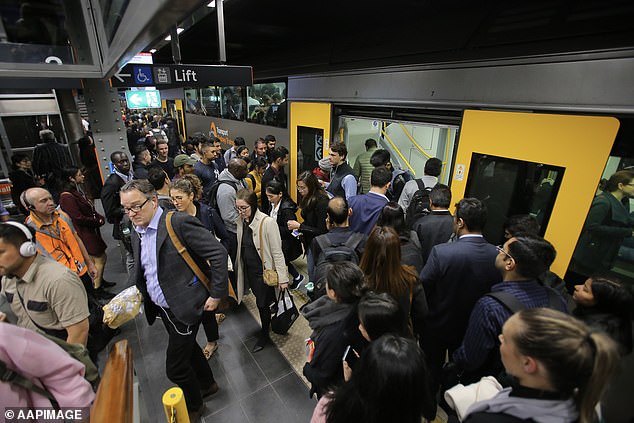Working from home could soon become a legal right for millions of Australians across the country.
The Fair Work Commission is studying the possibility of making working from home (WFH) a legal right that could affect 2.2 million Australians’ wage awards.
The conclusions and recommendations of the review will then be presented to the federal government, which will take the reforms into consideration.
The government will then decide whether to make any changes to the legislation and take them to parliament.
According to data from the Australian Bureau of Statistics, around 37 per cent of Australians regularly work from home, down slightly from 2022.

If working from home is legislated, it will affect 2.2 million Australians in awarded wages (file image of a home office)


Currently, an Australian can only apply to work from home in certain circumstances. However, they must have worked at his job for at least 12 months (stock image of a work Zoom call)
Currently, Australian employees do not have a general or legal right to work from home.
However, workers can apply to their employer under certain conditions, but only if they have worked for their boss for a minimum of 12 months.
If work from home were to become a new labor law, it would most likely anger business groups who are against the federal government’s latest labor reforms.
The review comes just a month after new workplace laws were passed in Australia allowing workers to disconnect from the workplace.
Under that new law, Australian workers can ignore calls and texts from their bosses and colleagues after hours.
According to research from the Melbourne Institute, the majority of Australian workers would like to have the right to work from home at least part of the time.
Sixty percent of workers were happy with the flexibility of a hybrid work arrangement, which is a combination of working from home and in the office.
Fair Work published a discussion paper in January presenting evidence that remote working did not negatively impact overall productivity.
Fair Work also found that working from home gave carers and parents more time to juggle the demands of home and work.


Goodbye rat race? 60 percent of workers said they were happy with hybrid work. Flexibility is also beneficial for carers and parents, who can better balance their responsibilities (file image of Sydney’s peak travel time)


A Fair Work report noted the benefits of working from home but warned it was harder for employees to have “spontaneous collaboration” (file image pictured)
However, the document did raise that remote working presented challenges for employers, such as making it difficult for bosses to conduct mentoring.
It also made it difficult for workers to have “spontaneous collaboration” with each other.
“Greater flexibility around when and where people work can also create ambiguity around when workers can disengage from work, which can impact well-being,” the discussion paper reads.
Liberal senator James Paterson believes it should be the responsibility of the employer and the worker to decide whether an employee works from home full-time.
“For employers and employees to work together, there are some types of work where working from home works very well for both the company and the employees, and not the type of work that, due to its nature, is inherent to showing up in the office,’ he said.
“And really, that shouldn’t be the government’s decision.”
Fair Work is currently speaking to businesses and unions to get their perspectives on working from home as part of its awards review.
Employment Hero chief executive Ben Thompson told Daily Mail Australia the debate around flexible working has accelerated.
‘These conversations are crucial. “The shift towards flexible working arrangements has opened up a world of opportunity, not only for companies to tap into a broader talent pool, but also for a diverse set of people to interact with the workforce,” he said.
‘And it’s not just limited to working from home, it enables a work culture that is adaptive, inclusive and productive.
‘It is essential that these discussions do not veer into political tug-of-war, but rather focus on improving productivity and global competitiveness.
“This is not just about individual rights or operational flexibility for businesses, but about creating a more inclusive and efficient Australian workforce.”
The government’s recent sweeping workplace changes saw the latest reforms passed in February, which included giving casual workers who work full-time the option to transition to a permanent role.
The establishment of minimum wages and labor standards for informal economy workers also came into play.


Australian workers want flexibility they got used to during the pandemic

